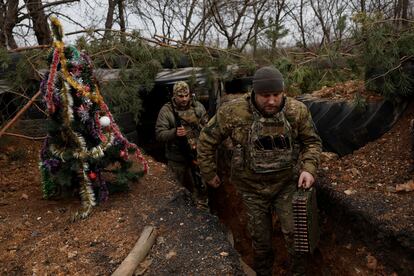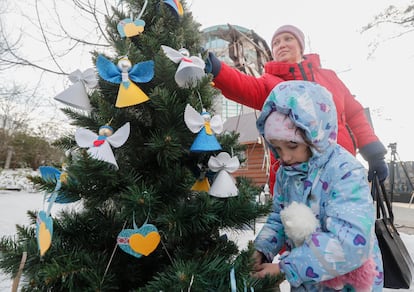Ukraine celebrates Christmas early under shadow of Russian invasion
For the first time the Orthodox Church has permitted its faithful to celebrate on December 25, in addition to the traditional January 7, signaling a move away from the Moscow Patriarchate


Olha and his family will celebrate Christmas twice this year. For the first time, blackouts permitting, he will cook Kutia - a typical boiled wheat pudding with poppy seeds and honey - on December 25, which has been an official holiday in Ukraine for a few years now but is not officially Christmas. A large majority of the country’s religious flock are faithful to the Orthodox Church and a tradition that adheres to the Julian calendar, whereby the birth of Jesus Christ is celebrated on January 7. This year, under the shadow of Russia’s war in Ukraine, many families have decided to commemorate December 25 to bring themselves closer to the traditions of most of Kyiv’s Western allies.
The Orthodox Church has this year approved celebrations among its congregations on December 25, signaling another step on the path some Ukrainians are demanding to distance themselves from the Moscow Patriarchate and other traditions and cultural symbols they consider stamped by the Kremlin. However, for now Orthodox decision-makers have established that this new celebration will be an addition to, not a substitution for, January 7. This year, Christmas will come twice in Ukraine.
Despite this concession, and the fact that even before the Russian invasion a third of the Ukrainian faithful were in favor of aligning the celebration of Christmas with the Gregorian calendar, which marks the date of Jesus’ birth on December 25, a majority of Ukrainian citizens - especially the elderly - prefer to stick to existing tradition. “We can’t change the dates overnight,” says Father Ivan, who leads a Ukrainian Orthodox church in Kramatorsk, in the Donbas region, where the heaviest fighting is currently taking place. “It doesn’t make sense. It’s like celebrating New Year’s in February.” In the wake of the Russian Revolution, the Bolsheviks adopted a modified Gregorian calendar for civil purposes, but the Moscow Patriarchate continued to observe Julian tradition.
Father Ivan’s parish, the largest in its area, belongs to a branch of the Orthodox Church that split from the Moscow-affiliated Ukrainian Orthodox Church in January 2019. It was yet another effort to step away from Russia and the Moscow Church leadership, which even after Vladimir Putin unleashed a full-scale invasion under the guise of a “special military operation” maintained ironclad support for the Kremlin and preached warmongering rhetoric. Patriarch Kirill of Moscow, the Primate of the Russian Orthodox Church, has been linked to the KGB by several Western intelligence agencies and has blessed the invasion of Ukraine, stating that Russian soldiers who are killed in the conflict will be cleansed of their sins, further inflaming the current mood of division in the Ukrainian Church.
The war has stripped Ukraine of most of its pre-invasion festive cheer, but there are scraps of tinsel, strings of small lights and bells here and there. In Dnipro, a few lights and decorations in department stores offer a reminder that it is Christmas. In Kyiv, the annual Christmas market is not operating but there is a large tree in its place. In Ivano-Frankivsk, in Western Ukraine, a huge illuminated fir tree has been temporarily replaced by a tent where passers-by can charge their cellphones and seek some warmth.
Outside Father Ivan’s church in Kramatorsk, where Russian missile strikes on the city’s railway station killed 57 people in April, the night is pitch black. The constant bombardment of Ukraine’s essential infrastructure in attempt to break the will of the civilian population has left the city in darkness and freezing in the deep Ukrainian midwinter. Inside, a few candles and a generator – “used as sparingly as possible” – Father Ivan insists, allow the Eucharist to be observed. He says it is not necessary to alter dates to continue a transition from Moscow: “This is our tradition.”

Heavy fighting and a looming counter-offensive
In Dnipro, blackouts have left Dmitry and his family without electricity for days. His son-in-law managed to get hold of a small generator, so they plan to celebrate, even if it cost them over $1,000 in a highly inflated market. “We will celebrate more for the generator than anything else really,” he says with a shrug. Dmitry is 78 years old and as far as he is concerned, Christmas is January 7, the date his family has celebrated for years. He says that even during the Communist dictatorship, when the authorities prevented people from attending churches, his parents, grandparents and siblings sang Christmas songs at home.
Sisters Svetlana and Victoria gave their children gifts on December 19, the feast of St. Nicholas, the archbishop whose figure inspired Santa Claus, when gifts are traditionally given in Ukraine. On December 25 they have planned a family meal - they say they feel like inaugurating a “new tradition” - but they are saving the best for January 7. “Even if we have to cook in the street and dine by candlelight again, the date is important. We can’t let them steal Christmas from us too,” says Victoria.
This is the toughest holiday season in decades for Ukraine, with heavy fighting on the eastern front and a looming counter-offensive in the south, Russian shelling, swarms of Iranian suicide drones targeting critical infrastructure, broken families, thousands dead and thousands more missing, with no end to the hostilities in sight.
The debate about when to celebrate Christmas and to which calendar to adhere is not new in Ukraine. This year, the Ukrainian Orthodox Church has left it up to each congregation to decide whether to have an extra ceremony on December 25, although as this year it falls on a Sunday, there were already scheduled church services. Now, however, the Orthodox leadership is considering implementing a broader reform of the dates in the future: the Ukrainian Ministry of Culture has already launched a public survey about when people want to celebrate Christmas.
Sign up for our weekly newsletter to get more English-language news coverage from EL PAÍS USA Edition
Tu suscripción se está usando en otro dispositivo
¿Quieres añadir otro usuario a tu suscripción?
Si continúas leyendo en este dispositivo, no se podrá leer en el otro.
FlechaTu suscripción se está usando en otro dispositivo y solo puedes acceder a EL PAÍS desde un dispositivo a la vez.
Si quieres compartir tu cuenta, cambia tu suscripción a la modalidad Premium, así podrás añadir otro usuario. Cada uno accederá con su propia cuenta de email, lo que os permitirá personalizar vuestra experiencia en EL PAÍS.
¿Tienes una suscripción de empresa? Accede aquí para contratar más cuentas.
En el caso de no saber quién está usando tu cuenta, te recomendamos cambiar tu contraseña aquí.
Si decides continuar compartiendo tu cuenta, este mensaje se mostrará en tu dispositivo y en el de la otra persona que está usando tu cuenta de forma indefinida, afectando a tu experiencia de lectura. Puedes consultar aquí los términos y condiciones de la suscripción digital.








































